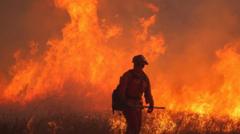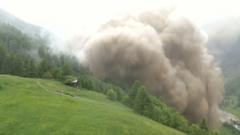Scientists struggle to explain unusually high warmth as the world surpasses previous climate benchmarks.
Record January Heat Raises Alarm Among Climate Experts

Record January Heat Raises Alarm Among Climate Experts
Unprecedented January temperatures stoke concerns over climate change effects.
Last month, January 2025, emerged as the hottest January recorded globally, which is leaving climate scientists scratching their heads about the rapid trends in climate change. It was anticipated that temperatures would dip slightly compared to January 2024 due to a shift from the El Niño weather pattern, but instead, temperatures soared, breaking the previous year's record by nearly 0.1C according to the European Copernicus Climate Service.
The ongoing rise in global temperatures is largely attributed to greenhouse gas emissions from human activities, particularly the combustion of fossil fuels. However, researchers are struggling to pinpoint the reasons behind January's anomalously high temperatures. Since mid-2023, several records have fallen, with temperatures averaging 0.2C above expectations.
"It's abundantly clear that the continuing warming trend is driven by increasing greenhouse gas concentrations," stated Gavin Schmidt, Director of NASA’s Goddard Institute for Space Studies. He further noted that scientific inquiries are underway to elucidate why early 2025 is witnessing such exceptional heat.
January's temperatures clocked in at approximately 1.75C higher than those recorded in the late 19th Century prior to significant anthropogenic climate influences. Early last year, global temperatures received a boost from a natural trajectory—El Niño—which is characterized by unusually warm surface waters in the Pacific Ocean, elevating atmospheric temperatures. This year, however, a weak La Niña pattern is expected, which traditionally brings about cooler global temperatures.
Adam Scaife, head of decadal predictions at the UK Met Office, remarked, "Given our previous assessments, January 2025 was supposed to be cooler than its predecessor, yet we are observing quite the opposite."
Several hypotheses are being investigated to account for the unexpected warmth. One theory posits a prolonged oceanic response to the mild El Niño. Because the El Niño phase was not considerable, it might have allowed previously accumulated oceanic heat to escape into the atmosphere. Yet researchers express skepticism regarding this theory due to historical data suggesting such effects should have diminished by now.
Samantha Burgess, deputy director of Copernicus, suggested the idea that changing oceanic behavior could explain ongoing high sea temperatures, which directly influence air temperatures. Another significant theory involves a decrease in atmospheric aerosols—tiny particles that have historically served to cool the planet by reflecting sunlight. The decline in aerosols from industrial activity and shipping in regions like China may be exacerbating warming by eliminating this previously mitigating factor. James Hansen, a pioneer climate scientist, voiced concerns that the UN agency may have underestimated the impact of aerosols.
While not universally accepted, the reduction in aerosols could indicate a troubling outlook for the climate. Experts like Scaife warn of a potential "nightmare scenario," where warming oceans could diminish reflective clouds, further exacerbating global climate change.
Moving forward, researchers anticipate more data to definitively determine whether the recent warmth is a temporary fluke or a signal of accelerated global warming. The prevailing opinion is that while 2025 may appear cooler than the exceedingly warm previous two years, the unexpected temperature spikes suggest that further records could be on the horizon if greenhouse gas emissions remain uncurbed.
Dr. Burgess concluded, warning that unless humans mitigate emissions, rising global temperatures are inevitable, and "2025 might simply represent one of the cooler years in a continually warming trend."





















